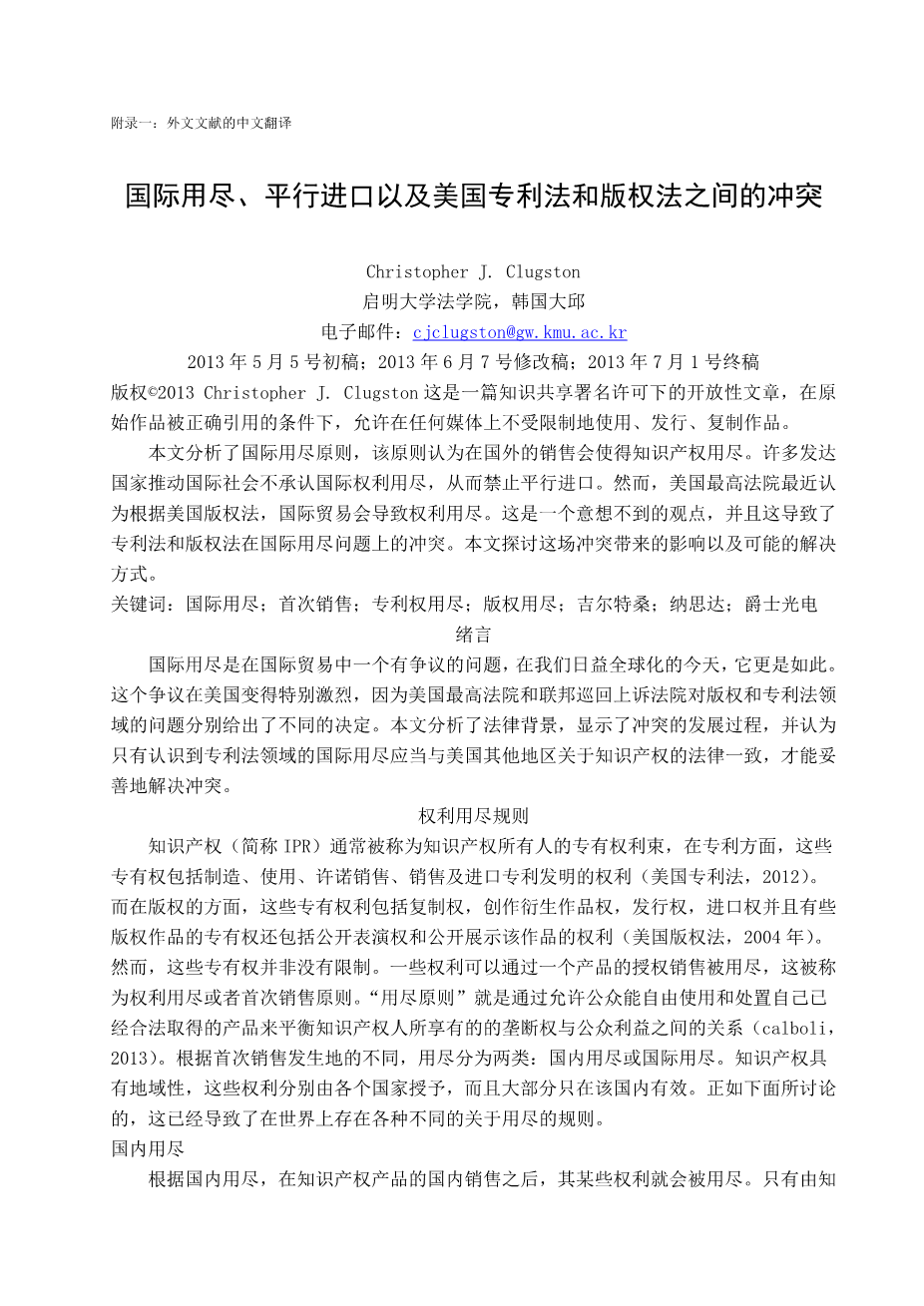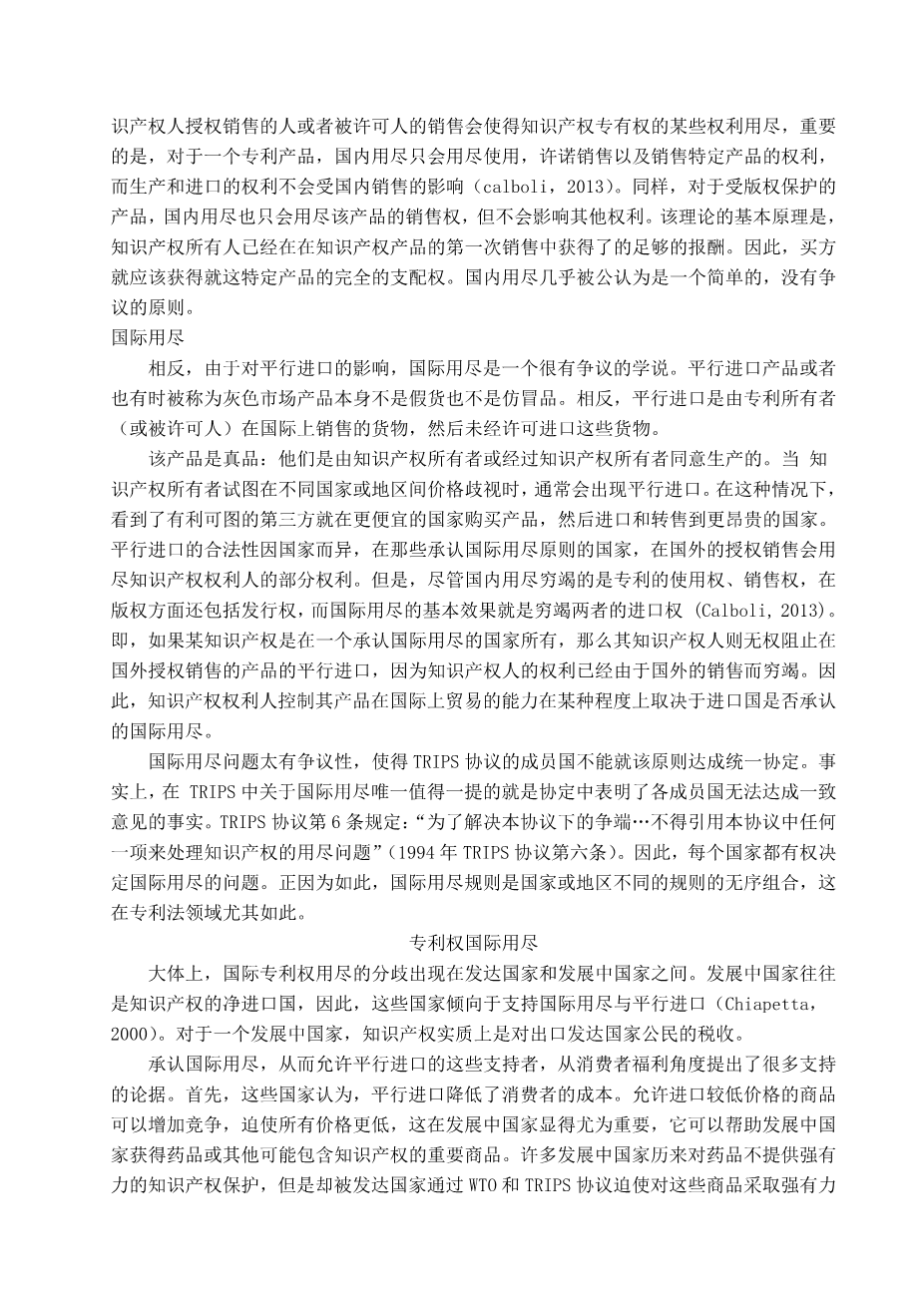论汽车平行进口政策对我国知识产权制度的影响外文翻译资料
2022-09-20 10:27:22
附录二:外文原文
International Exhaustion, Parallel Imports, and the Conflict between the Patent and Copyright Laws of the United States
Christopher J. Clugston
Law College, Keimyung University, Daegu, South Korea
Email: cjclugston@gw.kmu.ac.kr
Received May 5th, 2013; revised June 7th, 2013; accepted July 1st, 2013
Copyright copy; 2013 Christopher J. Clugston. This is an open access article distributed under the Creative Commons Attribution License, which permits unrestricted use, distribution, and reproduction in any medium, provided the original work is properly cited.
This article analyses the principle of international exhaustion—the doctrine that sales in a foreign country extinguish intellectual property rights. Many developed countries have pushed the international community not to recognize international exhaustion, and thus, to prevent parallel imports. However, the Supreme Court of the United States has recently held that there is exhaustion under US Copyright law for international sales. This is an unexpected holding and it creates a conflict between copyright law and patent law on the issue of international exhaustion. This article examines the effects and possible resolution of that conflict.
Keywords: International Exhaustion; First Sale; Patent Exhaustion; Copyright Exhaustion; Kirtsaeng; Ninestar; Jazz Photo
Introduction
International exhaustion is a controversial issue in international trade. Itrsquo;s even more so in our increasingly globalized world today. This controversy has become particularly heated in the United States, where the Supreme Court and the Court of Appeals for the Federal Circuit have given differing decisions on the issue in the areas of copyright and patent law, respectively. This article analyses the legal background, showing how the conflict developed, and also suggests that the proper resolution of the conflict is to recognize international exhaustion in the area of patent law to bring it in line with the other areas of intellectual property under United States law.
The Law of Exhaustion
Intellectual property rights (IPR) are often referred to as a bundle of exclusive rights granted to the IPR owner. In the case of patents, those exclusive rights include the right to make, use, offer for sale, sell and import the patented invention (Patent Act, 2012). And in the case of copyrights, those exclusive rights include the right to reproduce, create derivative works, distribute, import, and for certain categories, the right to publicly perform and publicly display the work (Copyright Act, 2004).
These exclusive rights, however, are not without limitation. Some of the rights can be extinguished by an authorized sale of a product. This is known as exhaustion or, alternatively, the first sale doctrine. The exhaustion doctrine was created to balance the monopoly power granted to IPR owners with the interests of the public by allowing the latter to use or dispose of lawfully acquired products as they choose, unencumbered (Calboli, 2013). Depending on where the first sale is made, exhaustion falls into one of two categories: national exhaustion or international exhaustion. IPR are territorial in nature; the rights are granted separately by each individual country and, mostly, only have effect in that country. As discussed below, this has led to a variety of different rules regarding exhaustion around the world.
National Exhaustion
Under national exhaustion, certain rights are extinguished after a domestic sale of a product covered by IPR. In order for the sale to exhaust exclusive rights, it must be an authorized sale by either the IPR owner or a licensee. Importantly, for a patented product, national exhaustion only extinguishes the right to use, offer for sale, and sell that particular product. Making and importing are not affected by a domestic sale (Calboli, 2013). Likewise, for a copyrighted product, national exhaustion will extinguish the distribution right for that product but will not affect the other rights.
The rationale behind the doctrine is that the IPR owner has received the full benefit of the IPR from the first sale. Thus, the purchaser should receive unencumbered ownership rights in that particular product. National exhaustion is a straightforward and uncontroversial doctrine that is nearly universally recognized.
International Exhaustion
Conversely, international exhaustion is a far more contentious doctrine because of its effect on parallel imports. Parallel imports, or grey market goods as they are sometimes referred, are not fake or counterfeit goods. Instead, parallel imports are goods that are sold internationally by a patent owner (or a licensee) and then subsequently imported without permission. The products are genuine: they are made by or under the authority of the IPR owner. Parallel imports normally occur when an IPR owner attempts price discrimination among different countries or regions. In such situations, a third party that recognizes the arbitrage opportunity will purchase the product in a cheaper country for import and resale in a more expensive country. The legality of parallel imports varies from country to country.
In those countries that recognize the doctrine of international exhaustion, an authorized sale in a foreign country will extinguish certain of the IPR ownerrsquo;s rights. But whereas domestic exhaustion extinguished the exclusive rights of use and sale for patents, and of distribution for copyrights, the primary effect of international exhaustion is to extinguish the exclusive right to import for both1 (Calboli, 2013). That is, if IPR are owned in a country that recognizes the doctrine, the IPR owner cannot prevent the parallel importation of authorized products sold abroad because the ownerrsquo;s rights have been exh
剩余内容已隐藏,支付完成后下载完整资料


英语原文共 5 页,剩余内容已隐藏,支付完成后下载完整资料
资料编号:[148327],资料为PDF文档或Word文档,PDF文档可免费转换为Word




